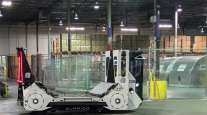Staff Reporter
ATA Leader Chris Spear Doesn’t See Automation as Threat to Drivers

[Stay on top of transportation news: Get TTNews in your inbox.]
NASHVILLE, Tenn. — American Trucking Associations President Chris Spear said he doesn’t view the ongoing advancement of autonomous trucking as a threat to drivers, since economic factors will ensure demand for drivers for years to come.
“I’m not threatened by it because of where our economy, where our country and where our industry is headed,” Spear said during a June 2 address at the 2022 Recruitment and Retention Conference, hosted by Conversion Interactive Agency, ATA and Transport Topics June 1-3. “It’s all about growth. Right now, one in 16 jobs in the United States is trucking related. The top job in 29 states is being a truck driver.”
Spear stressed, however, that discussion centered on automation is “thought-provoking.”

Chris Spear by John Sommers II for Transport Topics
More From R&R
He noted that the trucking industry is at a pivotal moment when it comes to the technology, with a lot of key questions being asked. While he acknowledged some division over where automation in trucking is headed, he stressed that the technology has arrived. It’s undergoing innovation, testing and deployment, and he has seen it work.
“It’s not just a discussion point — I actually rode in a fully automated truck,” Spear said. “It went 60 miles on the interstate in Arizona. Hands never touched the wheel. You begin to appreciate the reality in a situation like that.”
He noted, however, that demand for trucking services — from many corners — will ensure that drivers’ services will be required for years to come.
“We’re moving 72.5% of domestic freight,” Spear said. “Long gone are the days when trucking and rail would duke it out. We’re now rail’s biggest customer.”
Spear said he has witnessed that transformation over the last 15 years, and noted that the current supply chain issues and bottlenecks demonstrate why it’s important for different modes to work together. But he also highlighted why embracing innovation is important.
“These are all trends that are happening,” Spear said. “It’s all about growth, supply and demand, but also the fact that consumers want things immediately. And in today’s world that doesn’t necessarily require a brick-and-mortar store. Just point and click and it’s at your doorstep. It used to be two days. Now it’s less than a day.”
Spear emphasized the added pressure these expectations place on the supply chain and trucking, in particular. ATA estimates the country is short about 81,000 truck drivers, and has said that figure could grow to 160,000 by 2030 if recruitment efforts are not expanded.

Host Michael Freeze turns to Thomas Healy of Hyliion and Tom Lincoln of Dana to discuss how electric truck manufacturers are handling the future of equipment maintenance. Tune in above or by going to RoadSigns.TTNews.com.
“Right now we’re moving more with fewer people and less equipment,” Spear said. “You’re going to have to add more people. You’re going to have to add more equipment. You’re going to have to make improvements in infrastructure. And you’re going to have to innovate. There’s room for both to coexist. People and automation can solve this problem collectively without being threats toward that future. So, there’s plenty of room.”
But it will take time, and change will come gradually, he said.
“You will see it occurring in localities and regions — it’s already happening. And the value proposition isn’t going to be based on displacing our existing workforce. Why would it, when you’re short 81,000 drivers already? That’s only going to continue to increase as we grow our economy and demand continues to rise.”
Spear urged the industry to search for ways that humans and automation can coexist. He pointed specifically to autonomous trucks being more suited for regional operations, whereas human drivers will be better suited for longhaul operations. He believes this kind of delineation could help ease and offset the high demand for drivers.
“I don’t look at this as a threat,” Spear said. “I look at this as how innovation could actually help alleviate some of the pressure that we’re feeling on the supply chain, and on the industry to meet our customers’ demands.”
Want more news? Listen to today's daily briefing below or go here for more info:




